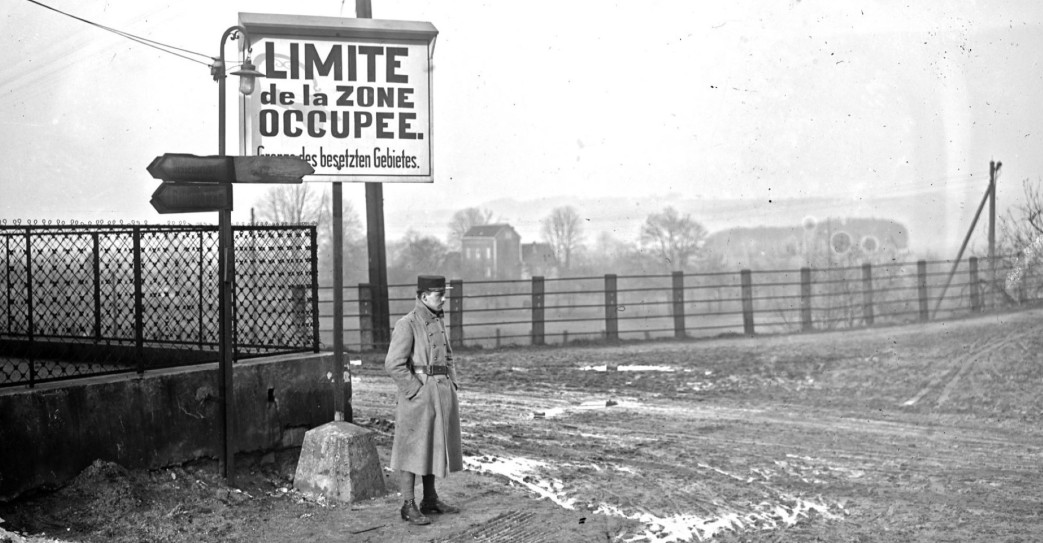A major new European crisis, with many unforeseen consequences, erupted when French imperialism occupied the Ruhr region of Germany in January, 1923 over failure the pay reparations stipulated in the Treaty of Versaille. The French Communist Party issued this anticipatory statement in September, 1922.
‘The Attitude of the Communist Party of France in the Event of War’ from International Press Correspondence. Vol. 2 No. 78. September 12, 1922.
Resolution Adopted by the Convention of the Seine Federation.
At the Convention of the Seine Federation of the French Communist Party, which was held on the 3rd of September in Paris, a resolution was unanimously adopted which we publish below:
I.
The danger of war in Europe still continues to exist. The Versailles Peace Treaty imposes a burden upon the German proletariat which it cannot bear. The Parliament of the Bloc National, however, obstinately demands the carrying out of an impossible treaty, and seeks by every imaginable pretext to justify a military occupation of the Ruhr District. This imperialist policy of provocation which is so reactionary that the English and Italian bourgeoisie decline to take any part in it, is undermining the German State, accelerating the collapse of the mark, and thrusts the German worker into indescribable misery. The German bourgeoisie enriches itself whilst the impoverishment of the masses is being continually intensified. A fresh revolution is coming on in Germany, which the French bourgeoisie, in complete solidarity with the German bourgeoisie, will attempt to defeat in exactly the same manner as the first. The bourgeoisies of these two countries are at one and the same time engaged in rivalry and yet are solidly united; they compete in their quests for raw materials, labor power and markets, but they are united in their determination to suppress the suppress the rising proletarian revolution.
II.
The utter inability of Germany to comply with the demands of the Versailles Peace Treaty, creates a situation from which a new world war must inevitably result. French capital sees itself compelled to use force against Germany if it does not wish to take the burden of the war upon itself. It cannot allow a revolution on the French frontiers. A French invasion of revolutionary Germany is a sure prospect for the near future. If the French proletariat permits the French army to be constituted as the Gendarme of Europe, and to crush the movement for emancipation of the German proletariat, it will assume in the face of history the responsibility for a calamity, the heavy consequences of which will long have to be borne by the working class of the whole world.
III.
On the other hand the imperialist policy of France can find expression in the occupation of the Ruhr, which act would seal the ‘alliance between the French iron capitalists and the German coal barons, and assure the hegemony of the French iron and steel industry in Europe. This seizure of the Ruhr Basin would not only be an oppressive burden for the proletarians of this district, who are immediately concerned, but its effects would also very speedily make themselves felt by the whole of the French proletariat through a general reduction of wages, for the French bourgeoisie within the Ruhr District, will, thanks to the low value of the mark, have found a supply of cheap labor power. The French proletariat must be blind not to oppose with all the means at its disposal, the realization of such a plan.
IV.
The task of the Communist Party consists in the first place, in exposing and bringing home to the French workers, the present situation and the importance of the approaching events. The Party must bring the organized as well as the unorganized workers to the consciousness that the government of the Bloc National wishes to debase them into breakers of revolution. To bring the masses of dispossessed workers and peasants to an understanding of the actual situation means to rouse the spirit of resistance against the criminal conduct of the governing men of France.
V.
The Party leaders have immediately instituted a sympathetic campaign through the press, and by public meetings, against war in the spirit of the foregoing statements. This campaign must sooner or later be conducted jointly with all the workers’ organizations which are willing and prepared to conduct an open fight against war. Only such a campaign will put the party into a position to exercise a determining influence upon the masses at the decisive moment. It alone will be able to bring to shame the criminal plans of the ruling class; it alone can open up an auspicious prospect for the revolutionary struggle.
VI.
The Party, in closest collaboration with the German brother party, and the Communist International, must take advantage of the revolutionary conjuncture which a fresh war would offer, while it must, with all its means, direct and develop its struggle towards the idea of the revolutionary general strike for the overthrow of capitalism.
International Press Correspondence, widely known as”Inprecorr” was published by the Executive Committee of the Communist International (ECCI) regularly in German and English, occasionally in many other languages, beginning in 1921 and lasting in English until 1938. Inprecorr’s role was to supply translated articles to the English-speaking press of the International from the Comintern’s different sections, as well as news and statements from the ECCI. Many ‘Daily Worker’ and ‘Communist’ articles originated in Inprecorr, and it also published articles by American comrades for use in other countries. It was published at least weekly, and often thrice weekly.
PDF of full issue: https://www.marxists.org/history/international/comintern/inprecor/1922/v02n078-sep-12-1922-Inprecor.pdf
